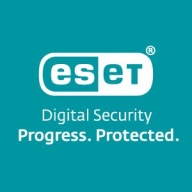

ESET Endpoint Protection Platform and Microsoft Defender for Business are both key players in the cybersecurity market. ESET takes the upper hand with its low impact on system resources and custom reporting capabilities.
Features: ESET Endpoint Protection Platform excels with comprehensive threat detection, minimal CPU and RAM usage, and features like ThreatSense technology, Antispyware, and HIPS. Microsoft Defender for Business offers integrated threat detection, seamless integration within the Microsoft ecosystem, and high-value security features.
Room for Improvement: ESET could expand its heuristic capabilities, simplify VM licensing, and improve integration options. Some users also mention challenges with deployment and support. Microsoft Defender for Business needs better threat detection, reduced false positives, more intuitive external integration, and a focus on affordability for smaller organizations.
Ease of Deployment and Customer Service: ESET often requires a straightforward setup but provides deployment options across on-premises, hybrid, and cloud. Customer service feedback is mixed, with varied responsiveness. Microsoft Defender for Business benefits from strong integration and generally reliable support, though some users report challenges specific to non-Windows platforms.
Pricing and ROI: ESET offers competitive pricing for small and medium businesses, with flexible licensing impacting cost. Its resource efficiency contributes to perceived value despite varied pricing based on licensing terms. Microsoft Defender for Business offers good value within certain Microsoft subscriptions but can be costly as a standalone option. Both solutions provide indirect ROI by enhancing security and preventing problems, though direct ROI measurement is challenging.
I saw the return on investment with ESET Endpoint Protection Platform within months.
Using Microsoft Defender for Business results in cost reductions as it consolidates various features under one product, saving around 20% to 30% of the budget.
The value I see in Microsoft Defender for Business is in its ability to track and respond to application usage and security threats through its CASB and automation features, which are cost-beneficial.
Normally, I cannot give a ten for support of all brands, as it is not always possible to get full support from companies.
It is rated ten out of ten for its quality and assistance.
The onboarding support is exceptional, ensuring seamless integration and implementation.
Faster support is needed for endpoint security solutions.
In terms of scalability, I can rate it eight or nine out of ten.
Their support is phenomenal, offering quick assistance.
The cloud-based nature of the solution ensures high scalability.
The scalability of Microsoft Defender for Business is rated as ten, indicating it is very scalable.
In terms of scalability, I would rate Microsoft Defender for Business a ten.
In terms of stability, I can rate it at nine out of ten.
No customer complaints about its functionality or reliability.
Although it generally works, there are occasional issues and errors that sometimes require a complete system format to rectify.
I would rate the stability of Microsoft Defender for Business with a three out of ten, where one is very bad.
A lightweight version of ESET might be beneficial as many of our clients have older CPUs and RAM.
When we were using CrowdStrike, it used to detect and block pirated software, but ESET Endpoint Protection Platform is not doing that.
Extensive APIs to easily integrate our own systems with the platform for user configuration via their company portal.
Microsoft should provide batch management solutions with the application, integrating pass management with roles.
Features related to Advanced Persistent Threat detection vectors and cyber kill chain integrations are not available out-of-the-box.
There can be improvements in the user interface to make it more intuitive.
The pricing of ESET Endpoint Protection Platform is a bit high compared to other competitors.
I would rate ESET Endpoint Protection Platform a five for pricing on a scale from 1 to 10, where 1 is cheap and 10 is expensive.
Single-year pricing remains good.
The pricing is quite affordable at the enterprise level with no extra expenses noted.
Although the cost can be slightly higher, it expedites deployment, which is beneficial, especially for startups.
The best feature of ESET Endpoint Protection Platform is that I get all the details about which user is using it, how much time they spend on websites, and all related information.
Machine learning, especially through live detection, detects threats that are blocked based on reputation or sandbox detection.
The primary purpose is to protect computers from viruses and ransomware.
The threat detection capabilities are robust, with a dedicated research team and a continuously updated threat feed.
Its vulnerability management is regarded as one of the best in the industry.
The most effective features of Microsoft Defender for Business include its threat detection and response capabilities in managing vulnerabilities and ransomware attacks.
| Product | Market Share (%) |
|---|---|
| ESET Endpoint Protection Platform | 3.0% |
| Microsoft Defender for Business | 2.1% |
| Other | 94.9% |


| Company Size | Count |
|---|---|
| Small Business | 67 |
| Midsize Enterprise | 17 |
| Large Enterprise | 21 |
| Company Size | Count |
|---|---|
| Small Business | 15 |
| Midsize Enterprise | 2 |
| Large Enterprise | 3 |
ESET Endpoint Protection Platform (EPP) is a cybersecurity solution designed to protect businesses of all sizes against a wide array of cyber threats. Its advanced technologies and user-friendly interface provide robust security for endpoint devices, such as desktops, laptops, and mobile devices, without compromising performance. ESET's approach combines multiple layers of protection, including traditional signature-based detection with advanced heuristic analysis, behavioral monitoring, and machine learning, to effectively counter both known and emerging threats.
ESET's Endpoint Protection Platform is based on a multi-layered defense strategy, which utilizes various technologies like cloud-based scanning, network attack protection, and exploit blockers. This strategy ensures solid protection against malware, ransomware, phishing attacks, and advanced persistent threats (APTs), offering businesses peace of mind regarding their digital security. ESET's platform protects computers, mobile devices, file servers and virtual environments. It’s available as a standalone product and as a part of a wider enterprise cybersecurity bundle, ESET PROTECT Enterprise, which also includes file server security, disk encryption, a cloud sandbox and EDR.
ESET PROTECT Advanced
The ESET PROTECT Advanced provides best-in-class endpoint protection against ransomware & zero-day threats, backed by powerful data security.
Performance and Compatibility
ESET is widely acclaimed for its light system footprint, ensuring that endpoint protection does not come at the expense of performance. This efficiency is crucial for maintaining operational productivity without sacrificing security. Moreover, ESET's solutions are compatible with a wide range of operating systems, including Windows, macOS, Linux, and Android.
Centralized Management
ESET Endpoint Protection Platform is managed via ESET Security Management Center, a centralized management console that provides real-time visibility into on-premise and off-premise endpoints. This simplifies the administration of security policies, streamlines the detection and response processes, and provides detailed reporting capabilities, making it easier for IT professionals to maintain a secure and compliant IT environment.
Microsoft Defender for Business is a new endpoint security solution that was designed especially for the small and medium-sized business (up to 300 employees). With this endpoint security solution, your company's devices are better protected from ransomware, malware, phishing, and other threats.
We monitor all Endpoint Protection Platform (EPP) reviews to prevent fraudulent reviews and keep review quality high. We do not post reviews by company employees or direct competitors. We validate each review for authenticity via cross-reference with LinkedIn, and personal follow-up with the reviewer when necessary.